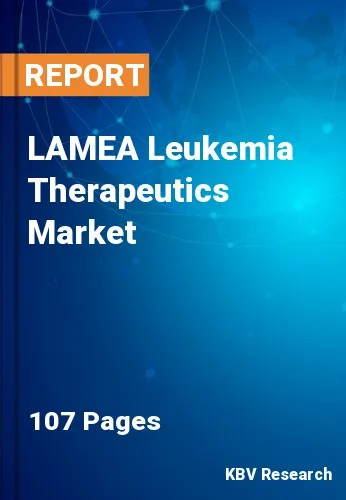The Latin America, Middle East and Africa Leukemia Therapeutics Market would witness market growth of 9.2% CAGR during the forecast period (2023-2029).
The demand for leukemia treatments is projected to increase over the course of the forecast period as more people become aware of the advantages of preventative healthcare. The market's expansion is anticipated to be fueled by government initiatives and programs that attempt to raise cancer awareness. The most common method of diagnosis for this type of cancer is a biopsy, though imaging is expected to become more common as technology advances and has an impact on the demand for leukemia therapies treatment in the near future.
High radiation exposure increases the chance of leukemia in those who are exposed. In the workplace, for example, prolonged exposure to high concentrations of solvents like benzene is a recognized risk factor. A person's risk of acquiring CLL is increased by two to four times if they have a first-degree relative who has the disease, such as a parent, child, or sibling.
But most people who get leukemia don't have a family member who has the illness. Prior to the onset of symptoms, a simple blood test can detect persistent leukemia. Cell treatments can effectively address a few unmet needs in AML. The second line of therapies and enhanced transplant outcomes are the most crucial. Numerous unclassified cell therapies are designed to close the performance gap left by allogeneic stem cell transplants. These unmet needs also offer significant growth opportunities for market growth.
The Middle East's population is aging swiftly, and since age is the main risk factor for developing cancer, its prevalence, and incidence are increasing among all of the populations in the region. These trends have caused major issues for both the national and community-based health services. The UAE government has placed a high premium on creating a world-class healthcare infrastructure, which has caused the sector to expand and develop significantly over the past several years. With the incidence of lifestyle diseases increasing, the populations with relatively high-income levels will seek higher-quality healthcare. All of these factors are anticipated to aid in the market expansion in the LAMEA region.
The Brazil market dominated the LAMEA Leukemia Therapeutics Market by Country in 2022, and would continue to be a dominant market till 2029; thereby, achieving a market value of $212.8 million by 2029. The Argentina market is experiencing a CAGR of 9.8% during (2023 - 2029). Additionally, The UAE market would showcase a CAGR of 8.9% during (2023 - 2029).
Based on Drug Class, the market is segmented into Targeted Therapy & Immunotherapy and Chemotherapy. Based on Distribution Channel, the market is segmented into Hospital Pharmacies, Drug Store & Retail Pharmacies and Online Providers. Based on Type, the market is segmented into Chronic Lymphocytic Leukemia, Acute Lymphocytic Leukemia, Chronic Myeloid Leukemia, Acute Myeloid Leukemia and Others. Based on countries, the market is segmented into Brazil, Argentina, UAE, Saudi Arabia, South Africa, Nigeria, and Rest of LAMEA.
Free Valuable Insights: The Worldwide Leukemia Therapeutics Market is Projected to reach USD 11.7 Billion by 2029, at a CAGR of 6%
The market research report covers the analysis of key stake holders of the market. Key companies profiled in the report include Gilead Sciences, Inc., Bristol Myers Squibb Company, Sanofi S.A., AbbVie, Inc., Teva Pharmaceuticals Industries Ltd., Lupin Limited, Amgen, Inc., Takeda Pharmaceutical Company Limited, Pfizer, Inc. and Novartis AG.
By Drug Class
By Distribution Channel
By Type
By Country
Our team of dedicated experts can provide you with attractive expansion opportunities for your business.

